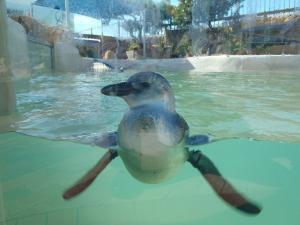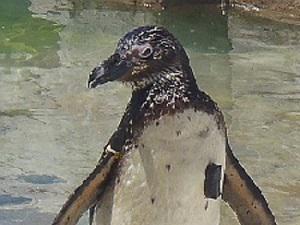Michelle Bradshaw (née du Toit)
The proposed feasibility study will investigate a novel way of tracking penguins using acoustic ultrasonic telemetry. Techniques will be refined ex situ and recommendations made regarding the applicability of this technology to track seabirds at sea.

Juvenile African Penguin.
Almost half the global population of the Endangered African penguin breeds on islands Algoa Bay in South Africa’s Eastern Cape Province. The underwater sound generated during various ongoing and proposed industrial development in Algoa Bay could impact negatively on these globally important seabird populations. However, there is a lack of available information on the effects of marine construction and industrial activities on diving birds. In order to assess the impact of underwater noise on the movement and foraging behaviour of African penguins, the birds need to be tracked. Acoustic ultrasonic tags may be an affordable alternative to satellite tracking; however, it is necessary to investigate whether this is feasible for the African penguin. Algoa Bay already has an extensive network of acoustic listening stations for studies on fish; this existing infrastructure and collaboration with the Ultrasonic Telemetry Group makes this technology a viable option for penguin research.

Juvenile African Penguin in tag attachment trial with dummy transmitter attached to feathers.
The proposed feasibility study will utilise the opportunity afforded by ex situ populations of African penguins to investigate a novel way of tracking wild seabirds at sea. The response of penguins to the transmitted signal, tag attachment positions and techniques, as well as the efficacy of the tag to record and transmit foraging events will be established.
If acoustic tags prove feasible for investigating the movement and foraging of African penguins (in particular juvenile and non-breeding birds), such a tagging project will likely be conducted in conjunction with a further investigation into the bioacoustics impacts of industrial developments on top predators and marine ecosystem health.